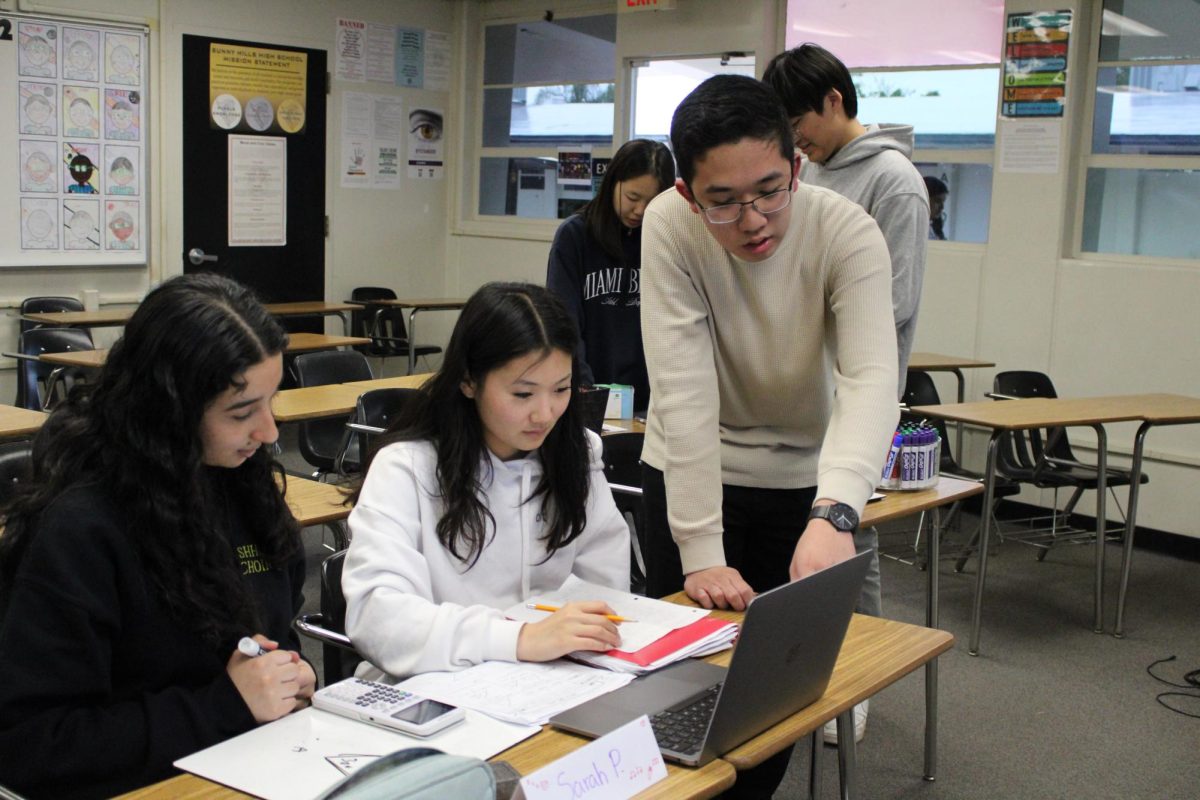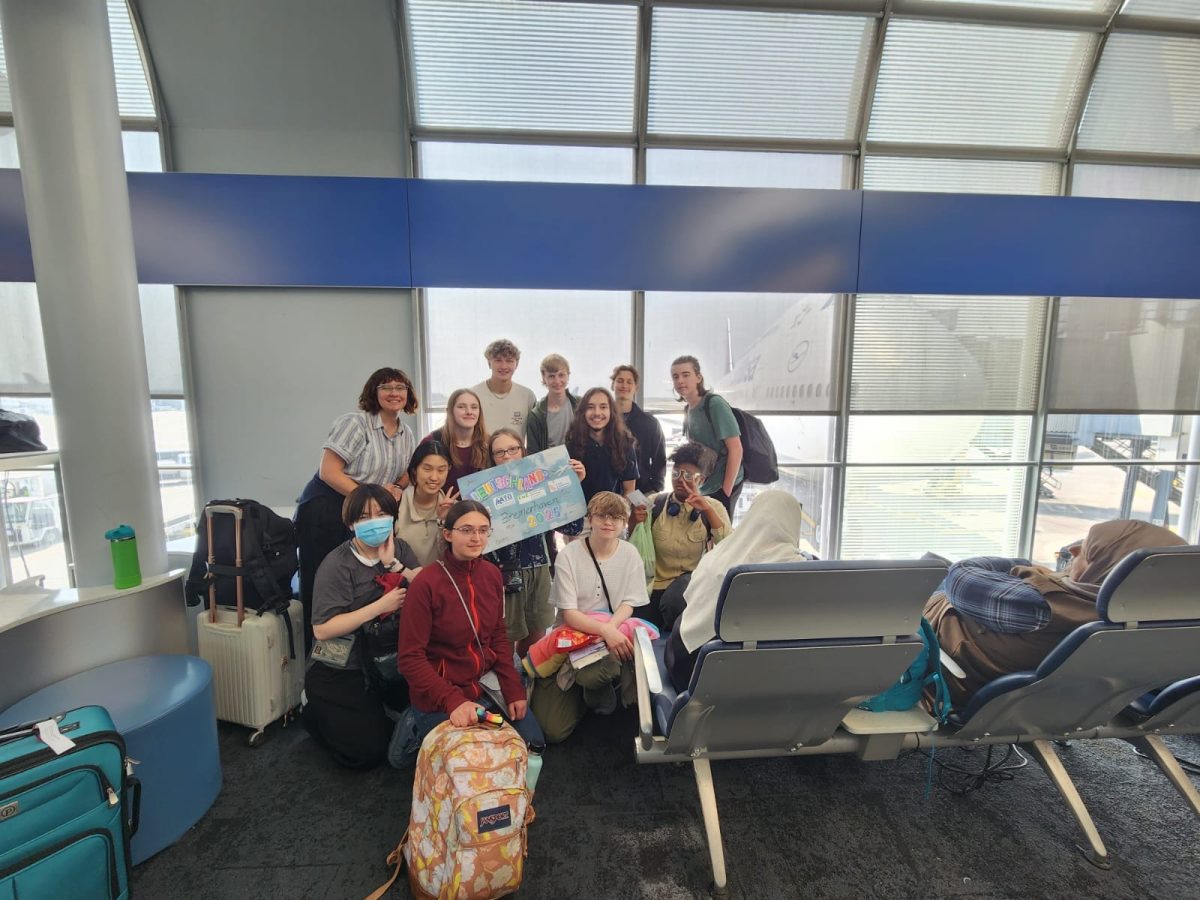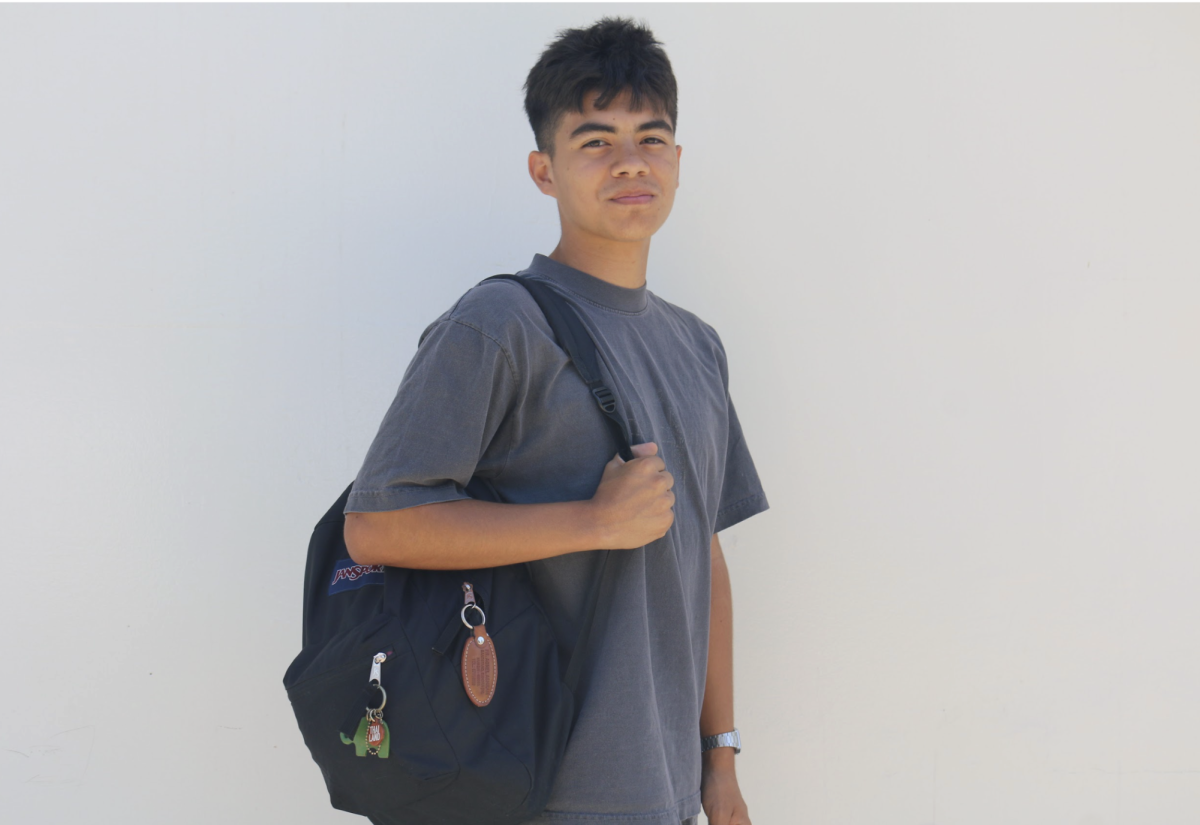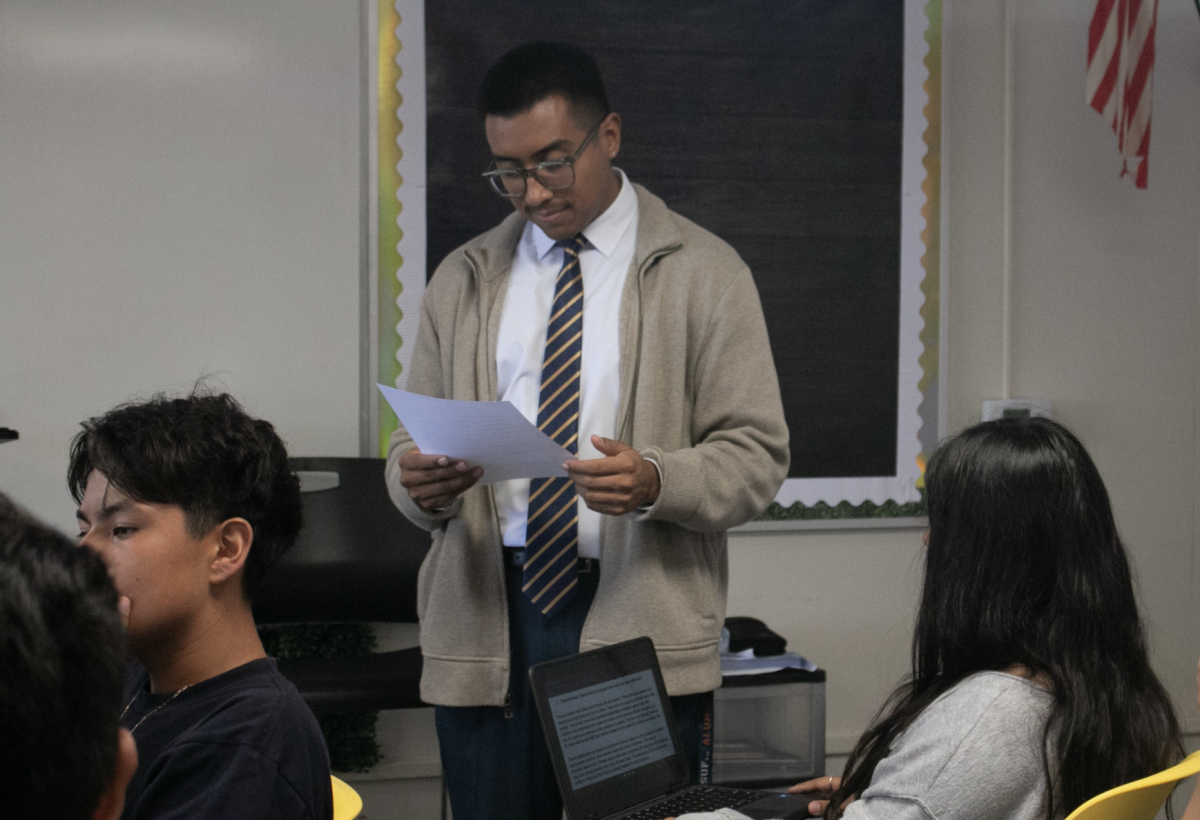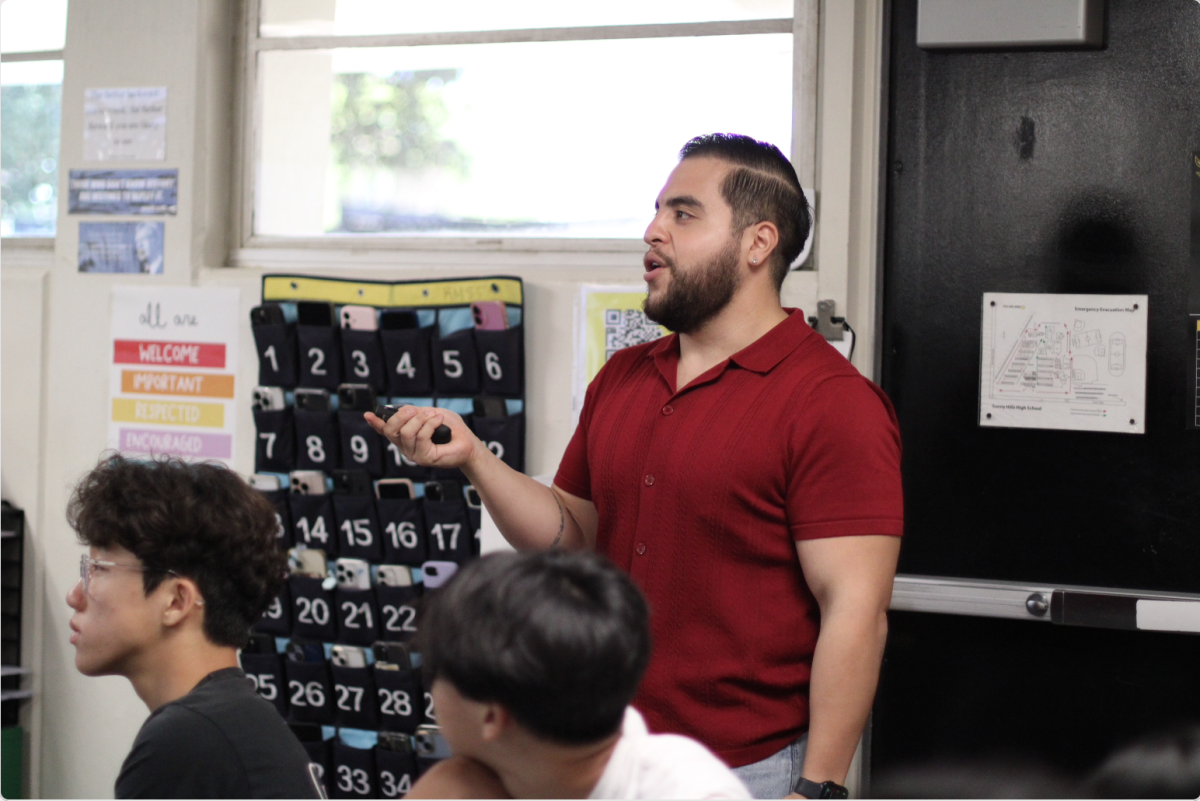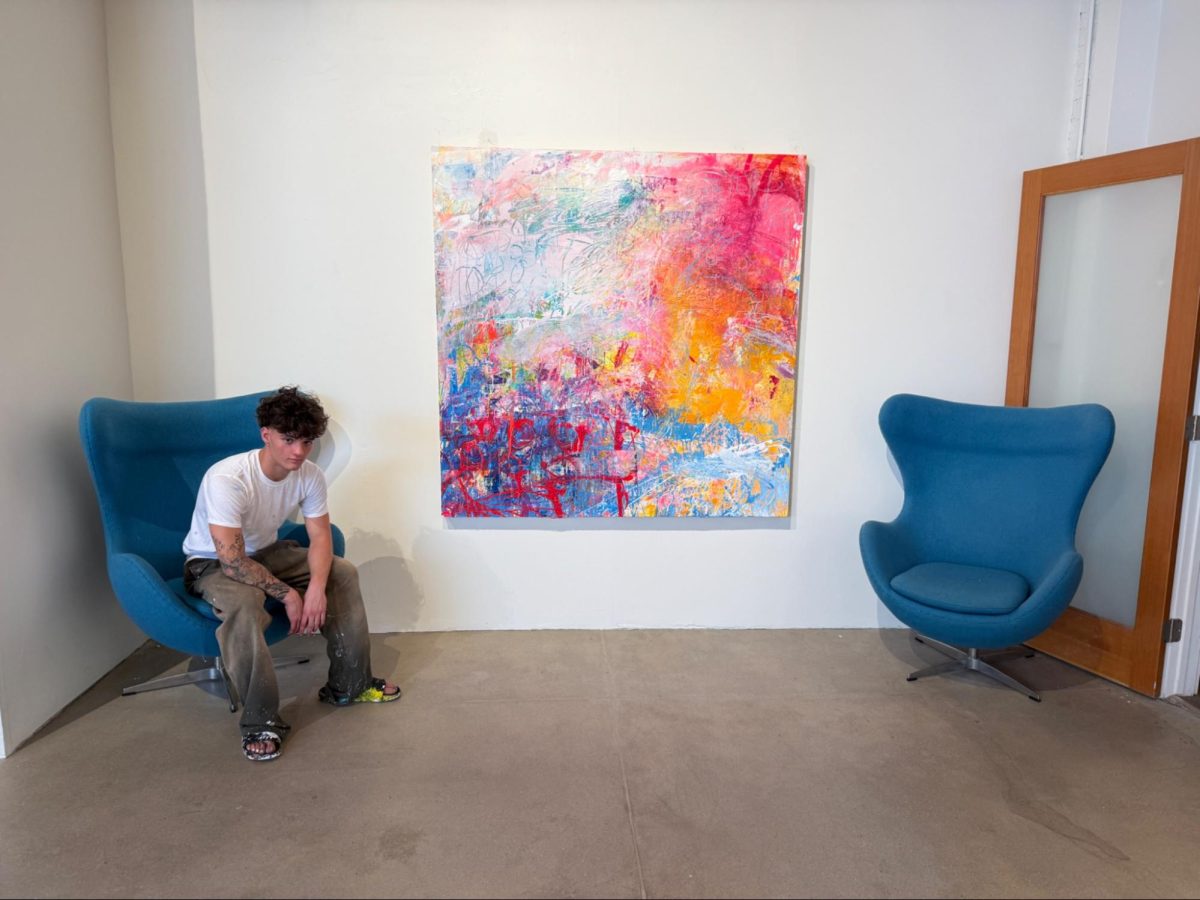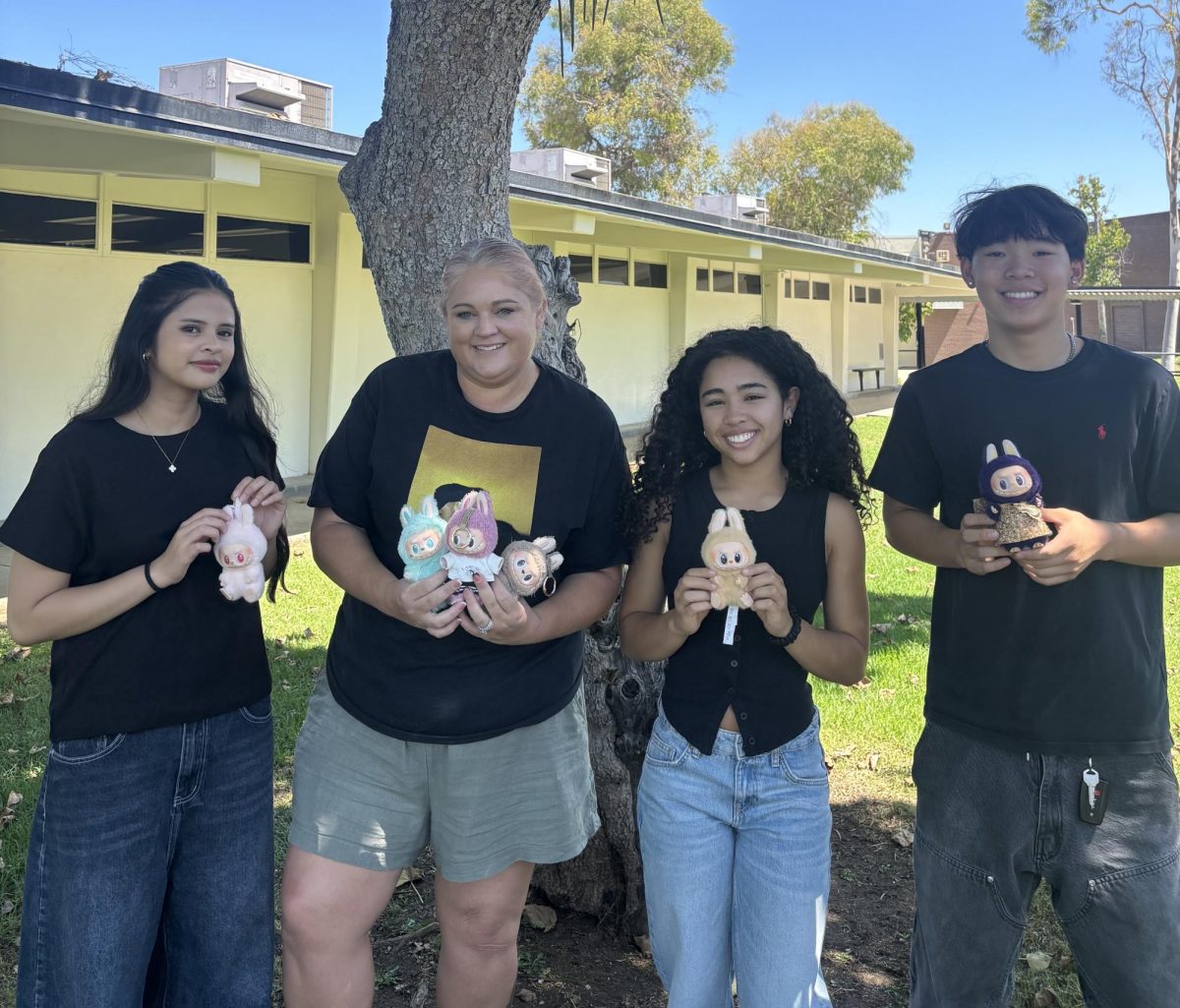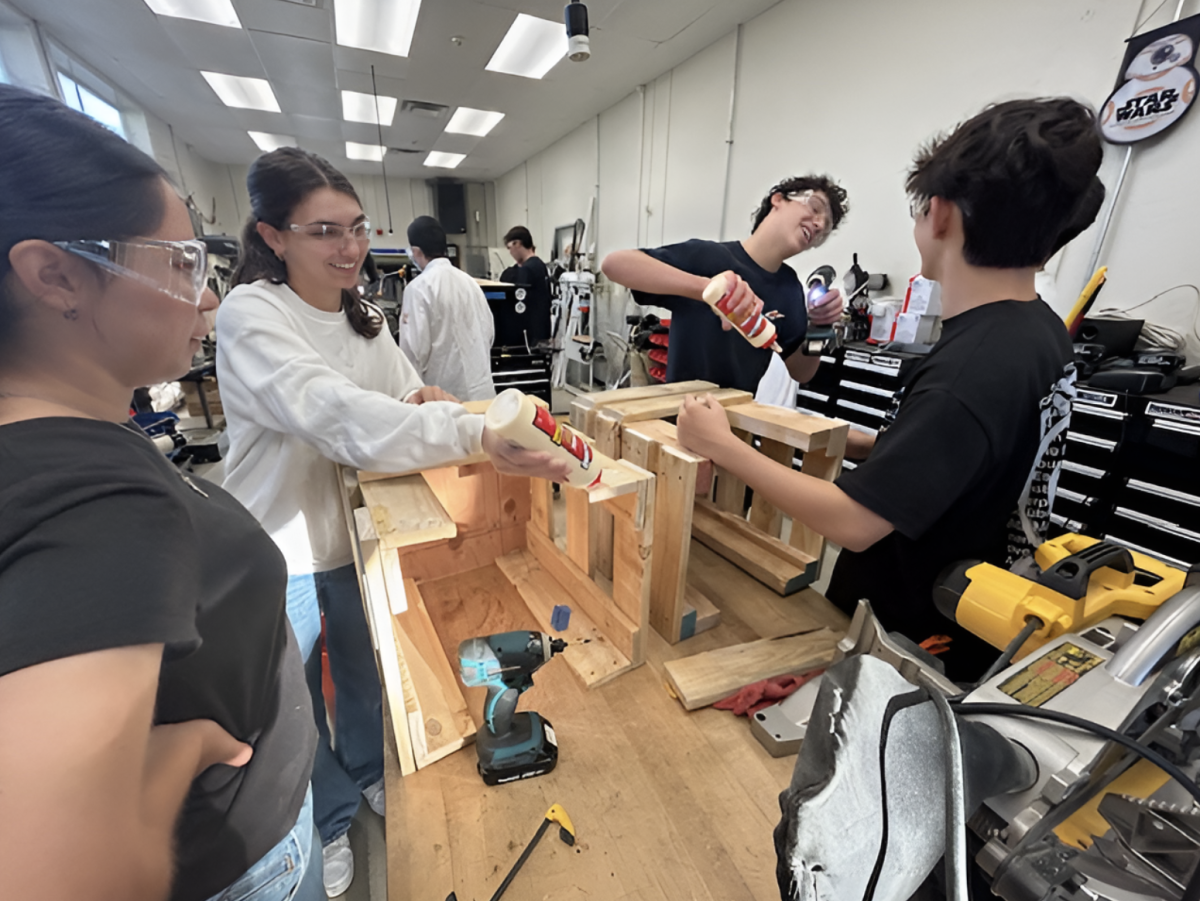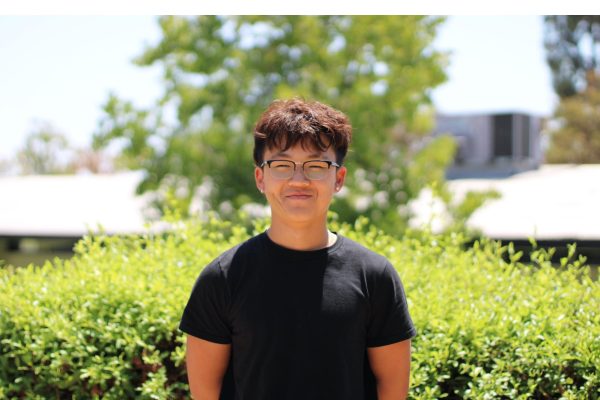Sin²θ + cos²θ = 1.
For those who’ve never taken pre-calculus (also known as trigonometry) before, this equation may lead many to scratch their heads and mutter to themselves, “What the …?”
Meanwhile, some might associate it with what they learned from geometry — the Pythagorean theorem, a² + b² = c².
In fact, sin²θ + cos²θ = 1 actually derives from the same Greek mathematician who came up with the formula to determine the length of one side of a right, 90-degree triangle given the number for two other sides. The main difference for Pythagoras is this one, which uses the Greek alphabet theta (θ), applies to what math instructors call “unit circles.”
“You use that formula a lot in higher-level applications, just as in pre-calculus and in other related subjects in physics, such as with angles, and it keeps showing up in higher-level math,” senior Ethan Hsu said of his favorite math equation.
Hsu added that he first learned of this equation when he enrolled in Pre-Calculus in the summer of 2023.
“For me, my teacher didn’t really explain the theorem in depth when our class learned it, and she just told us to memorize it,” he said. “But the equation intrigued me in ways where I was thinking, ‘Why does this exactly happen?’ so I went online and watched videos about it, and when I found out how the sine squared plus cosine squared equals one became an identity, I was amazed.”
And it’s that amazement in Hsu about numbers, shapes and equations that has caught the attention of some of his math instructors, who have noted that the senior has taken seven math classes in the four years he has been attending Sunny Hills.
“It doesn’t work for all students,” said math instructor Dorothy Cheng, who usually teaches Geometry Honors and college prep Algebra 2. “But he has a very strong mathematical foundation; he is very hardworking and thorough.”
Cheng also found Ethan to be a student who stood out with his impressive work ethic, proving that he could achieve this feat.
“It’s very rare for a student to start with Algebra 1 as a freshman, take both Geometry and Pre-Calculus over the summer, and succeed in AP Calculus AB,” Cheng said. “Ethan is taking both AP Calculus BC and AP Statistics this year, which means he took (and excelled in) seven math classes in four years. I think that’s pretty impressive and worth an Accolade story.”
NOT FAIR AND SQUARE
Hsu did not originally calculate that his math journey would be so extensive.
But he realized as early as his freshman year that his starting point differed from many of his peers who came from the Fullerton School District [FSD].
Hsu, who came from Los Coyotes Middle School in La Mirada, said he learned number concepts and problem-solving skills through a curriculum the Norwalk-La Mirada Unified School District adopted known as integrated math.
So instead of learning geometry like most eighth-graders did in the FSD, the senior said his eighth-grade math instructor exposed students to parts of that concept combined with others like algebra and the next level after geometry, algebra 2.
“The Common Core curriculum [at my school] focused more on how concepts connected rather than just teaching them separately,” Hsu said. “It helped me see how algebra and geometry overlapped, even if it didn’t match the traditional path.”
So, upon signing up for classes here, he said he was disappointed to learn from his counselor that he could not enroll in Algebra 2. Instead, he had to start near the bottom of Sunny Hills’ math pathway — Algebra 1.
“At first, I was frustrated because I felt that my efforts to accelerate in middle school did not get me the credit I worked so hard for,” Hsu said.
By being forced to take Algebra 1 in his freshman year, he would only advance up to Pre-Calculus during his senior year, according to the Fullerton Joint Union High School District’s math sequence for students.
But Hsu’s goal was to take calculus in high school, so he figured out he would have to enroll in summer school math for the next two years to accomplish such an aspiration.
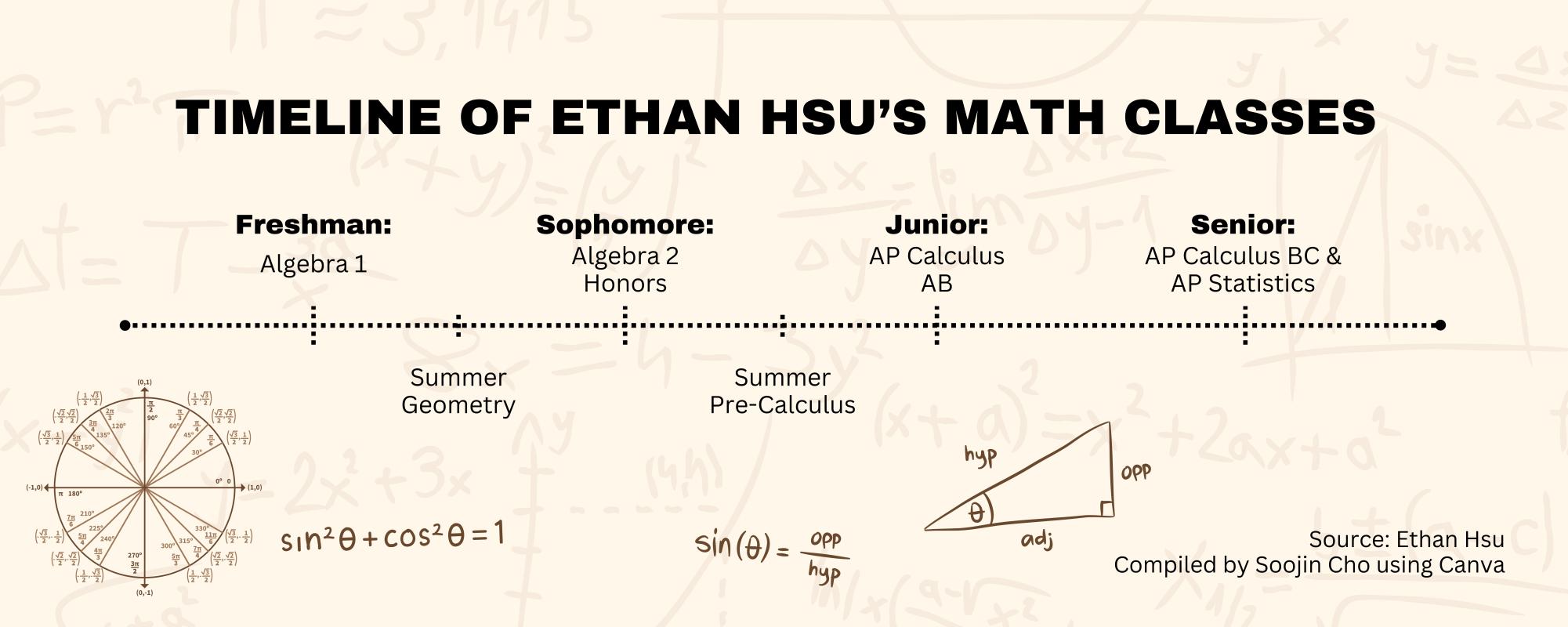
“I took this as an opportunity because I had holes in my knowledge from just learning from the Common Core program [in middle school],” he said. “Taking the math classes more in-depth would help me learn better, so I was actually more motivated.”
Rod and Grace Hsu, Ethan’s parents, have continued to support their son’s academic journey.
“Every parent wants academic success for their child, but Ethan has always been the one to craft his own academic schedule,” Rod Hsu said. “As long as he understood the commitment involved, we supported his choices in any way we could, such as driving him to and from his summer school math classes.”
Grace Hsu said she was also confident in her son’s abilities to catch up to his peers.
“We were not surprised by his commitment and focus on his schoolwork,” his mother said. “We also did not have any doubts because when Ethan is motivated, he is persistent in getting the job done.”
This commitment was not passed down from his parents but from his grandparents. His grandfather, William Hsu, worked as an accountant/comptroller, which involves many numbers, calling for the ability to manage and change numbers quickly. His grandmother, Mangelia Fabio, worked as an accountant/comptroller, similar to that of William Hsu, but has a state-issued license as a Certified Public Accountant and underwent more rigorous training to achieve the job. This shows Ethan Hsu’s choices may not have been impacted by his parents, but rather by his grandparents.
EFFORT SQUARED
Instead of staying home for the summer to spend time with his friends or with his hobbies, Ethan Hsu had to endure learning geometry in the summer after his freshman year — three weeks, Monday-Thursday for five hours each day to represent the fall semester of geometry and the same amount of time to represent the spring semester of the same subject.
That adds up to 60 hours of instruction for each summer session; 255 fewer hours of instruction that’s usually provided in a regular fall semester.
Even though summer school was a cram course, it was his only academic commitment at the time, which he used to his advantage.
“It was intense because of the fast pace, but I don’t think it was that much harder because, at least during the summer, it was the only course I would be working on, so I had more time to study and extra time to enjoy my summer,” the senior said.
The following summer in 2023 was when Ethan Hsu ended up taking Pre-Calculus, which at the time was his fifth math class; that’s more than double the number of math courses the average SH rising junior would have taken.
Cheng said Ethan Hsu was her standout student in her summer Pre-Calculus class.
“He is very hardworking and thorough,” the math teacher said. “He has that determination and drive to take advanced classes. He was probably among the best and top students from Sunny Hills (top 2),”
Little did she know that Pre-Calculus became more of a challenge for her student than the previous summer when he was enrolled in Geometry.
“I doubted myself for a bit, but I pushed through [for an A] by seeking other online videos as resources,” Ethan Hsu said.
GAINING IDENTITY AMONG HIS PEERS
By the start of his junior year in the 2023-2024 school year, the aspiring biomedical engineering major had reached his goal — he was enrolled in Advanced Placement [AP] Calculus AB, joining the math whizzes whom he couldn’t accompany in his freshman year.
One of his closest friends, senior Jeremiah Sung, said he has also noticed Ethan Hsu’s motivation in his math journey.
“What stands out about Ethan is his caring nature,” Sung said. “He’s incredibly smart, but he’s not at all the stereotypical ‘nerdy’ type people often expect; he’s not snobby or arrogant at all, and he’s genuinely driven, but it’s a drive that’s bigger than just his success.”
Though he could’ve skipped AP Calculus AB and signed up for AP Calculus BC, Ethan Hsu said he didn’t because he wanted a strong foundation in the subject.
“A part of it was that I didn’t know a lot of people skipped AB, but it was also sort of because I knew taking BC would be risky, especially during my junior year,” the senior said. “I thought it would be better to just take it slow and know everything because I still had my senior year to take BC.”
In this last school year, the senior’s AP Calculus BC teacher, Shirley Tan, said although she was not aware of what Ethan Hsu had to do to enroll in her class, she has taken notice of his work ethic.
“I was always impressed by his homework and test scores because he did well,” Tan said. “He is one of the star students in my class, and I have a lot of faith in him.”
Junior Madison Pyo, who is in Ethan Hsu’s fourth period AP Calculus BC class, said she appreciated her classmate’s care for his peers who struggled in the class.
“He did very well on all of his tests, so I would go up to him and ask for help with some concepts,” Pyo said. “I had no clue [he has taken seven math classes], and I think that’s amazing how he was able to do that because I don’t know if I could’ve dedicated that much time to math.”
SHAPING HIS FUTURE
Ethan Hsu said he joined the school’s after school student-centered tutoring program called Algebra Center in his senior year to branch out and use his honed math skills to help others.
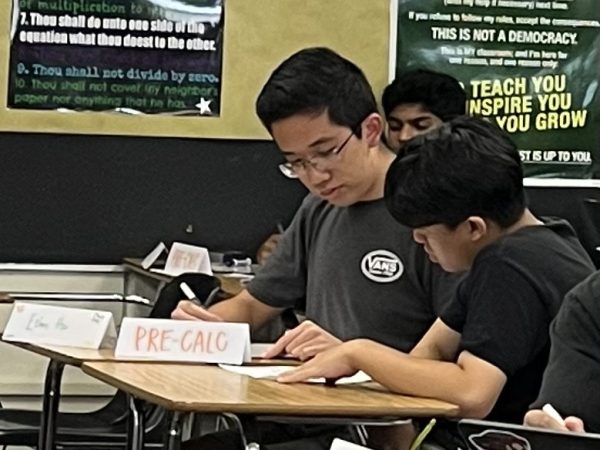
He offered this advice to those struggling with any level of math.
“What I would say is sometimes, especially when I have burned out, it’s best to step away from math,” Ethan Hsu said. “For me, I like doing word problems or relating math to real life, and sometimes taking a break just means changing how you connect with it — like exploring real-world patterns, solving fun puzzles or seeing math in everyday life. It keeps me alive without the pressure.”
Looking back, the senior said he has no regrets about taking seven math courses at Sunny Hills because the workload prepared him for the challenges of college-level work.
His early interest in math gradually turned into a strong passion for engineering. Because of this, he wanted to take calculus in high school to see if he could manage the challenging math that comes with a career in that field, he said.
“When I was able to handle the hard course load better than I thought, I wanted to experience more math, so I continued to accelerate even more,” said Ethan Hsu, who ironically favors geometry above his other previous and current math subjects. “It’s easy to see the real-life applications [in it].
“I really like proofs because they’re a little different than most math, and I like it because it’s very clear about [ideas like], ‘How do we figure this out?’ and geometry makes it really clear to answer that question.”
Ethan Hsu said he plans to major in biomedical engineering at the University of California, Irvine, to continue his journey, adding that his experience taking so many math classes has shaped his confidence level.
“I would say that all my previous math courses prepared me pretty well,” he said. “Calculus BC hasn’t been particularly difficult because all my rigorous math courses gave me problem-solving practice to figure things out eventually.”




